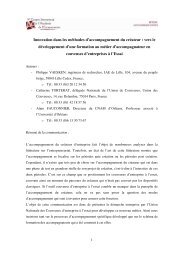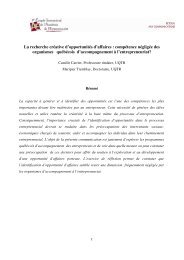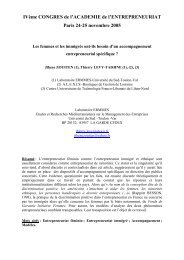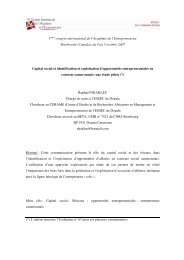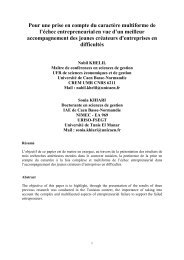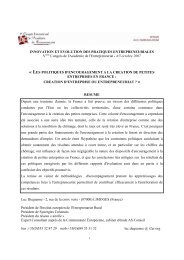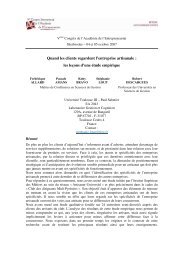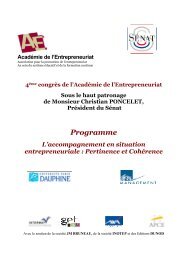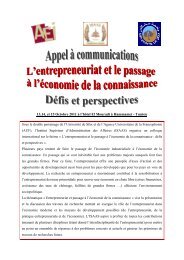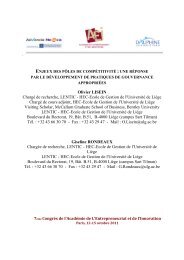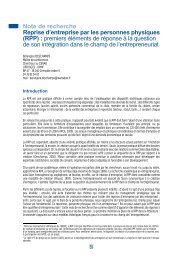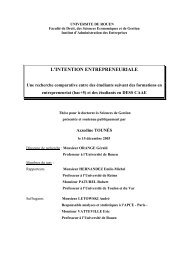14070. DRUCKER, P. (1985) Entrepreneurship and innovation : practiceand principles, New York, Harper Business71. EHRENBERG, A. (1991), Le Culte <strong>de</strong> la performance, Paris,Calmann-Lévy,72. EHRENBERG, A. (1995), L’Individu incertain, Paris, Calmann-Lévy73. EHRENBERG, A. (1998), La Fatigue d’être soi – dépression <strong>et</strong>société, Paris, Odile Jacob,74. ELFING, J. BRÄNNBACK, M., CARSRUD, A. (2009) Toward acontextual mo<strong>de</strong>l of entrepreneurial intentions, in CARSRUDA.L., BRÄNNBACK M. (eds) Un<strong>de</strong>rstanding the entrepreneurialmind, opening the black box, Dordrecht, Hei<strong>de</strong>lberg, London,New York, Springer, p 23-3475. EMIN S. (2003), L’intention <strong>de</strong> créer une entreprise <strong>de</strong>schercheurs publics : le cas français. Thèse <strong>de</strong> doctorat,Université Pierre Mendès France <strong>de</strong> Grenoble.http://asso.nordn<strong>et</strong>.fr/adreg/these_version_finale_p.pdf76. ERIKSON, E.H. (1968) I<strong>de</strong>ntity: Youth and Crisis, NewYork,Norton77. ETZKOWITZ, H. (1998) The norms of entrepreneurial science:the cognitive effects of the new university-industry linkages,Research Policy, Vol 27, n°8, p 823-83378. ETZKOWITZ, H. (2003a) Innovation in innovation: the triplehelix of university-industry-government relations, SocialScience Information, vol 42, N°3, p 293-33779. ETZKOWITZ, H. (2003b) Research groups as “quasi-firms”: theinvention of the entrepreneurial university”, Research Policy,Vol 32, n°1, p 109-12180. ETZKOWITZ, H., ZHOU, C. (2008), Introduction to a specialissue. Building the entrepreneurial university: a globalperspective, Science and Public policy, vol 35, N°9, p 627-63581. FAYOLLE, A. (2008) Entrepreneurship Education at acrossroad : towards a more mature teaching field ?, Journal ofEnterprising Culture, 16(4), p 325-33782. FAYOLLE, A., GAILLY, B. (2009) Évaluation d’une formation enentrepreneuriat : prédispositions <strong>et</strong> impact sur l’intentiond’entreprendre, M@n@gement, 12(3), 176-203.83. FAYOLLE, A., VERZAT, C. (2009) Pédagogies actives <strong>et</strong>entrepreneuriat: quelle place dans nos enseignements ? Revue<strong>de</strong> l’Entrepreneuriat, vol. 8, n°2, 200984. FAYOLLE, A., VERZAT, C. (2009), Pédagogies actives <strong>et</strong>entrepreneuriat : quelle place dans nos enseignements ?,Revue <strong>de</strong> l’Entrepreneuriat, vol 9, n°285. FERRE, D. (2005) Pour une approche orientante <strong>de</strong> l’écolefrançaise, Paris, Editions Qui plus est.86. FILION, L.J. (1997) Le champ <strong>de</strong> l’entrepreneuriat : historique,évolution, tendances, Revue Internationale PME, vol 10, n°2, p130-172, <strong>et</strong> cahier <strong>de</strong> recherche n°1997-01, janvier87. FILION, L.J. (1999) Espace <strong>de</strong> soi <strong>et</strong> vision, Cahier <strong>de</strong> recherchen° 1999-01, présentée lors du 6 ème colloque <strong>de</strong> UKSS (UnitedKingdom System Soci<strong>et</strong>y) tenu à Lincoln (UK) du 5 au 9 juill<strong>et</strong>1999 <strong>et</strong> publiée dans Castell A.M., GREGORY, A.J. (Eds) Synergymatters, New York, London : Kluwer Aca<strong>de</strong>mic/Plenum, pp613-61888. FILION, L.J. (2000) Carrières entrepreneuriales <strong>de</strong> l’avenir,espace <strong>de</strong> soi <strong>et</strong> essaimage, Cahier <strong>de</strong> recherche n° 2000-04,conférence présentée le 5 mai 2000 au colloque L’espritd’entrepreneurship 2000, Halifax, 2-6 mai 200089. FILION, P.J. (1994) Ten steps to entrepreneurial teaching,Journal of Small Business and entrepreneurship, 11(3), p 68-7890. FILION, P.J. (2008) Les représentations entrepreneuriales : unchamp d’étu<strong>de</strong>s en émergence, Revue internationale <strong>de</strong>psychosociologie 2008/1, Volume XIV, p. 11-43.91. FLAVELL, J.H. (1976) M<strong>et</strong>acognitive aspects of problem solving,in RESNICK, L.B. (ed) The nature of intelligence, Hillsdale,Lawrence Erlbaum Associates92. FRANCFORT I., OSTY F., SAINSAULIEU R., UHALDE, M. (1995)Les mon<strong>de</strong>s sociaux <strong>de</strong> l’entreprise.- Paris : Desclée <strong>de</strong> Brouwer93. FRANK A.I. (2007) Entrepreneurship and Enterprise Skills: AMissing Element of Planning Education, Planning, Practice &Research, Vol 22, N°4, pp 635-64894. GARAVAN, T.N., O’CINNEIDE, B. (1994), EntrepreneurshipEducation and Training Programmes: A Review and Evaluation– Part 1, Journal of European Industrial Training, Vol 18, N° 8,p3-1295. GARAVAN, T.N., O’CINNEIDE, B. (1994), EntrepreneurshipEducation and Training Programmes: A Review and Evaluation– Part 2, Journal of European Industrial Training, Vol. 18 N°11,1994, pp. 13-2196. GARTNER, W.B., SHANE, S.A. (1995) Measuringentrepreneurship over time, Journal of Business Venturing, vol.10, n°4, july, pp 283-30197. GASSE Y., D’AMPOURS A. (2000) Profession entrepreneur :avez-vous le profil <strong>de</strong> l’emploi ?, Montréal, Les éditionsTranscontinental, inc., Fondation <strong>de</strong> l’entrepreneurship98. GASSE, Y. (1985) A strategy for the promotion andi<strong>de</strong>ntification of Potential Entremreneurs at the secondarySchool Level, Frontiers of Entrepreneurship Research, BabsonCollege, Wellesley, MA, p 538-55999. GASSE, Y. (2011) Le développement <strong>de</strong> l’esprit entrepreneurialchez <strong>de</strong>s élèves <strong>de</strong>s cycles primaires <strong>et</strong> secondaires, 7èmecolloque <strong>de</strong> l’Académie <strong>de</strong> l’Entrepreneuriat, Paris.100.GASSE, Y., TREMBLAY M. (2006) Entrepreneurship Awareness:Construction and Empirical Validation of a Practical EvaluationInstrument, Working Paper, 2006-2007, Québec, UniversitéLaval101.GIBB, A. (2005) Towards the Entrepreneurial University, Policypaper # 003, NCGE, http://www.karafarini.sharif.ir/pdf/33.pdf102.GIBB, A. A. (2002) In pursuit of a new “enterprise” and“entrepreneurship” paradigm for learning: creative<strong>de</strong>struction, new values, new ways of doing things and newcombinations of knowledge, International Journal ofManagement Reviews, 4(3), p 233-269103.GIBB, A. A. (2005) Towards the entrepreneurial university,Entrepreneurship education as a lever for change, A NationalCouncil for Graduate Entrepreneurship (NCGE) reportpresenting and shaping the environment for graduateentrepreneurship in higher educationhttp://www.ncge.org.uk/publication/towards_the_entrepreneurial_university.pdf104.GIBB, A. A., HANNON, P.(2006) ‘Towards the EntrepreneurialUniversity’ International Journal of EntrepreneurshipEducation 4.pp 73-110105.GIBB, A.A., (2010) Concepts into practice: me<strong>et</strong>ing thechallenge of <strong>de</strong>velopment of entrepreneurship educatorsaround an innovative paradigm, The case of the InternationalEntrepreneurship Educators’ Programme (IEEP), International
141Journal of Entrepreneurial Behaviour &Research; Vol. 17 No. 2,p 146-165106.GLEADLE, P., CORNELIUS, N., PEZET, E., (2008) Enterprisingselves: How governmentality me<strong>et</strong>s agency, in Organization,15, 307-313107.GOLDSTEIN, H.A. (2008) The “entrepreneurial turn” andregional <strong>de</strong>velopment mission of universities, The Annals ofRegional Science, vol 44, n° 1, p83-109108.GORMAN, G., HANLON, D., KING, W. (1997), Some researchperspectives on entrepreneurship education, entrepriseeducation and education for small business management: aten-year literature review, International Small BusinessJournal,15(3), p56-77109.HAO Z., SEIBERT, S.E., HILLS, G. (2005), The mediating role ofself-efficacy in the <strong>de</strong>velopment of entrepreneurial intentions,Journal of Applied Psychology, 90, pp 1265-1272110.HARTSHORN, C., SEAR, L. (2005) Employability and enterprise:Evi<strong>de</strong>nce from the North-East, Urban Studies, vo 42, n°2, 271-283111.HEINONEN J., HYTTI, U. (2010) Back to basics : the role foteaching in <strong>de</strong>veloping the entrepreneurial university,Entrepreneurship and Innovation, Vol 11, N°4, p 283-292112.HEINONEN J., POIKKIJOKI, S.A. (2006) An entrepreneurialdirectedapproach to entrepreneurship education: missionimpossible ? Journal of Management Development, Vol 25,N°1, p 80-94113.HEMMRIEGELL, D. SLOCUM, J.W., WOODMAN, R.W. (2001),Management <strong>de</strong>s organisations, Bruxelles, De Boeck114.HENRY, C., HILL, F., LEITCH, C. (2005a) “EntrepreneurshipEducation and Training: can entrepreneurship be taught?”Part 1, Education and Training, 27, 2, pp 98-111.115.HENRY, C., HILL, F., LEITCH, C. (2005b) “EntrepreneurshipEducation and Training: can entrepreneurship be taught?”Part 2, Education and Training, 47, 3, pp158-169.116.HIGGINS, D., ELLIOTT, C. (2011) Learning to make sense : whatworks in entrepreneurial education ? Journal of EuropeanIndustrial Training, vol 35,n°4.117.HINDLE, K., KLYVER, K., JENNINGS, D.F. (2009) An “informed”intent mo<strong>de</strong>l: incorporating human capital, social capital, andgen<strong>de</strong>r variables into the theor<strong>et</strong>ical mo<strong>de</strong>l of entrepreneurialintentions, in CARSRUD A.L., BRÄNNBACK M. (eds)Un<strong>de</strong>rstanding the entrepreneurial mind, opening the blackbox, Dordrecht, Hei<strong>de</strong>lberg, London, New York, Springer, p 35-50118.HOLLAND, J.L. (1978) Manual for the vocational preferencesinventory, Palo Alto, CA: Consulting Psychology Press119.HOLLAND, J.L. (1985) Manual for the self-directed search,O<strong>de</strong>ssa, FL: Psychological Assessment Ressources120.HOLLAND, J.L. (1996) Exploring careers with a typology: Whatwe have learned and some new directions. AmericanPsychologist, 51, 397-406121.HONIG, B. (2004) Entrepreneurship Education: Toward a mo<strong>de</strong>lof contingency-based business planning, Aca<strong>de</strong>my ofManagement Learning and Education, 3(3), p 258-273122.HORNADAY, J.A. (1982) Research about living entrepreneurs,in KENT, C.A., SEXTON, D.L. <strong>et</strong> al. (Eds) Encyclopedia ofentrepreneurship, Englewood Cliffs, N.J. : Prentice Hall, pp20-34123.HOWARD P.J. (2006) The owner’s manual for the brain.Everyday applications from Mind-Brain Research, Austin,BardPress124.JEZEGOU A. (2010) Diriger par soi-même sa formation <strong>et</strong> sesapprentissages, in RAUCENT, B., VERZAT, C., VILLENEUVE, L.(2010) Accompagner les étudiants, Quels rôles pourl’enseignant, Quels dispositifs ? Quelles mises en œuvre ?,Bruxelles, De Boeck, p 53-85.125.JONNAERT, P. (2002) Compétences <strong>et</strong> socio-constructivisme.Un cadre théorique, 1 ère édition, Bruxelles, De Boeck126.JULIEN, P.A., MARCHESNAY, M. (1996), L’entrepreneuriat,Paris, Economica127.KATZ, J. (2003) The chronology and intellectual trajectory ofAmerican entrepreneurship education, 1876–1999, Journal ofBusiness Venturing , Vol 18,283–300128.KIRBY D.A., MULLEN, D. (1990) Developing enterprisingun<strong>de</strong>rgraduates, Journal of European Industrial Training, 14(2), pp 27-32129.KIRBY, D.A. (2003) Entrepreneurship, Mai<strong>de</strong>nhaid, McGrawHill,130.KIRBY, D.A. (2007). Changing the entrepreneurship educationparadigm. In FAYOLLE, A. (Ed). Handbook of research inentrepreneurship education, volume 1, A general perspective.USA: Edward Elgar, Cheltenham UK, Northampton, MA.131.KLANDT, H., (2004) Entrepreneurship Education and Researchin German-Speaking Europe, Aca<strong>de</strong>my of ManagementLearning and Education, 2004, Vol. 3, No. 3, 293–301.132.KOLVEREID, I. (1996), “Prediction of employment status choiceintentions”, Entrepreneurship Theory & Practice, Vol. 20 No. 3,pp. 47-56.133.KRICHEWSKY, M., FOURCADE, F. (2011), Apprendre à prendre<strong>de</strong>s risques, analyse <strong>de</strong> quatre moments clé dans troisdispositifs <strong>de</strong> formation pour futurs entrepreneurs, Dijon,Workshop international sur l’accompagnement <strong>et</strong> la formationen entrepreneuriat, 26-27 septembre.134.KRUEGER, N.D.M. (2009) What can entrepreneurship learnfrom neuroscience ? Presentation at the USASBE Conference,Anaheim135.KRUEGER, N.F. (2000) the cognitive infrastructure ofopportunity emergence, Entrepreneurship Theory andPractice, 24:5-23136.KRUEGER, N.F., (1993) The impact of prior entrepreneurialexposure on perceptions and new venture feasibility and<strong>de</strong>sirability, in Entrepreneurship Theory and Practice, 18: 5-21137.KRUEGER, N.F., BRAZEAL, D. (1994) Entrepreneurial potentialand potential entrepreneurs, Entrepreneurship Theory andPractice, 24:5-23138.KRUEGER, N.F.Jr. (2007) What lies beneath ? The experientialessence of Entrepreneurial Thinking, Entrepreneurship Theoryand Practice, January:123-137139.KURATKO, D.F. (2005) The emergence of entrepreneurshipeducation : <strong>de</strong>velopment, trends and challenges, inEntrepreneurship Theory and Practice, Sept, vol. 29, n°5, p 577-597140.LAM, A. (2010) From Ivory Tower traditionnalists toentrepreneurial scientists ? Aca<strong>de</strong>mic Scientists in FuzzyUniversity-Industry Boundaries, Social studies of Science, vol.40, Issue 2, p 307-340
- Page 1 and 2:
1DOSSIER EN VUE DE L’OBTENTION DU
- Page 3 and 4:
3RemerciementsEcrire et méditer su
- Page 5 and 6:
52ème partie - Eduquer l’esprit
- Page 7 and 8:
7Introduction : Relecture de mon pa
- Page 9 and 10:
9A - L’esprit d’entreprendre, m
- Page 11:
11Et il existe de réels freins dan
- Page 14 and 15:
14construction au cours du temps ?
- Page 16 and 17:
16notamment dans les stages supervi
- Page 18 and 19:
18pour que l’expérience soit eff
- Page 20 and 21:
20La concurrence entre des logiques
- Page 22 and 23:
221ère partie - Définir les objec
- Page 24 and 25:
24A - L’ambiguïté des recommand
- Page 26 and 27:
26intention de créer une entrepris
- Page 28 and 29:
Le référentiel français qui vien
- Page 30 and 31:
30n’est aucunement garanti ni exp
- Page 32 and 33:
32Lécuyer, (1994), le concept de s
- Page 34 and 35:
34plus sophistiquées et des liens
- Page 36 and 37:
36de la personne : ses intentions,
- Page 38 and 39:
38(résolution de problèmes comple
- Page 40 and 41:
40résume le modèle d’intention
- Page 42 and 43:
42Figure 6. Théorie de l’essai d
- Page 44 and 45:
44DimensionBiais deperceptionEmotio
- Page 46:
46occasionne à chaque fois une red
- Page 49 and 50:
49plus en plus complexes et entreti
- Page 51 and 52:
51autodidacte australien sur le suj
- Page 53 and 54:
53l’objet d’un processus d’ap
- Page 55 and 56:
55Figure 8. Objectifs de formation
- Page 57 and 58:
57entreprenante à cause de cette s
- Page 59 and 60:
59Figures 9. Dynamique de construct
- Page 61 and 62:
61la préparation des différentes
- Page 63 and 64:
63progressives adaptées et des cri
- Page 65 and 66:
65organisationnelles…) dans leur
- Page 67 and 68:
67(Verzat, 2010 :36). Mais l’espr
- Page 69 and 70:
69d’un refoulement inconscient d
- Page 71 and 72:
71Alors que faire ? Existe-t-il des
- Page 73 and 74:
732ème partie - Eduquer l’esprit
- Page 75 and 76:
75Rajhastan, en Jordanie et en Egyp
- Page 77 and 78:
77les rendre efficaces (Pittaway et
- Page 79 and 80:
79Les critiques adressées au syst
- Page 81 and 82:
81possibles (par exemple les écono
- Page 83 and 84:
83recrues, des compétences transve
- Page 85 and 86:
85plus dans une position de contrô
- Page 87 and 88:
87De même, Fayolle et Gailly (2009
- Page 89 and 90: 89convergente. Les principes géné
- Page 91 and 92: 91Principe 2 : Encourager, guider e
- Page 93 and 94: 93Principe 3 : Apprendre en groupe
- Page 95 and 96: 95actuels et à la difficulté à d
- Page 97 and 98: 97Une originalité de l’approche
- Page 99 and 100: 99méthodes appropriées à une sit
- Page 101 and 102: 101d’années le concept et le fon
- Page 103 and 104: 103Par ailleurs, il faut noter que
- Page 105 and 106: 105La visée actuelle du primaire a
- Page 107 and 108: 107importantes que d’autres, il e
- Page 109 and 110: 109incite à penser que la mise en
- Page 111 and 112: 111universitaire et de l’analyse
- Page 113 and 114: 113personnellement les étudiants q
- Page 115 and 116: 115Dans notre expérience selon les
- Page 117 and 118: 117sein de la communauté éducativ
- Page 119 and 120: 119fondamentale d’améliorer le s
- Page 121 and 122: 121d’objectifs éducatifs inter-r
- Page 123 and 124: 123ricochet, à aider les apprenant
- Page 125 and 126: 125mettre en œuvre. D’un côté,
- Page 127 and 128: 127de besoins des apprenants (techn
- Page 129 and 130: 129négligée. Même si un champ en
- Page 131 and 132: 131Comment faire coopérer monde ac
- Page 133 and 134: 133équation : D’une part, recour
- Page 135 and 136: 135Centrale de Lille pour la mise e
- Page 137 and 138: 137Liste des annexes1. VERZAT, C. (
- Page 139: 13936. BOURGEOIS, E. (2006) Les th
- Page 143 and 144: 143http://www.unige.ch/fapse/SSE/te
- Page 145 and 146: 145CARRE, P., MOISAN A., La formati



